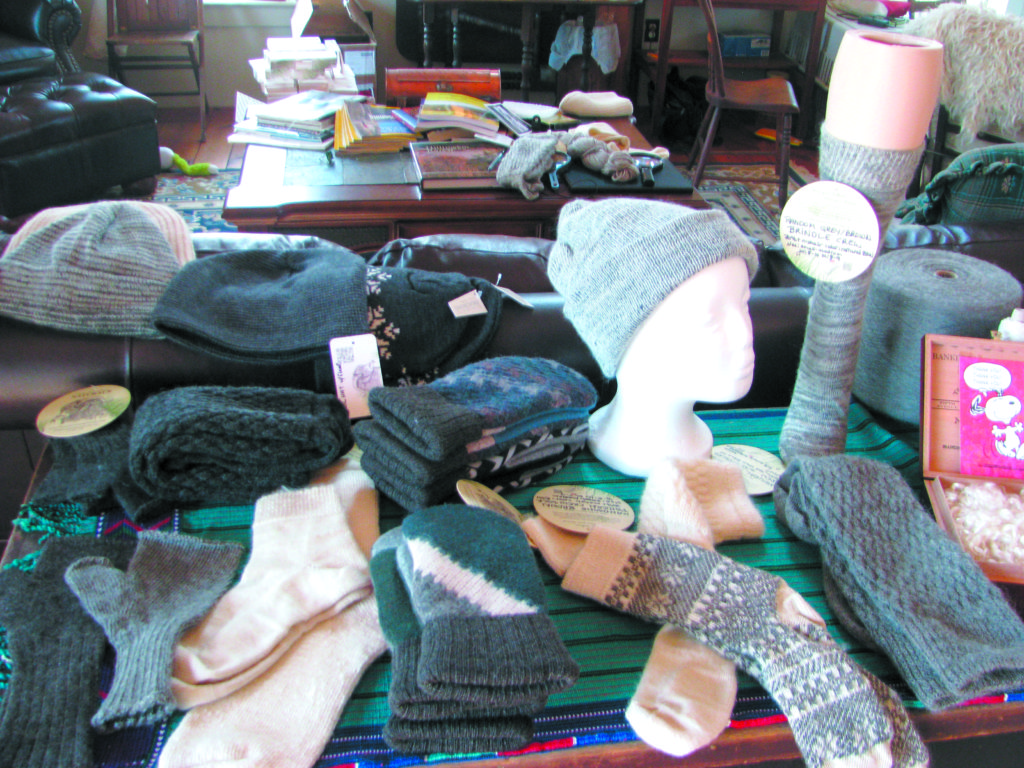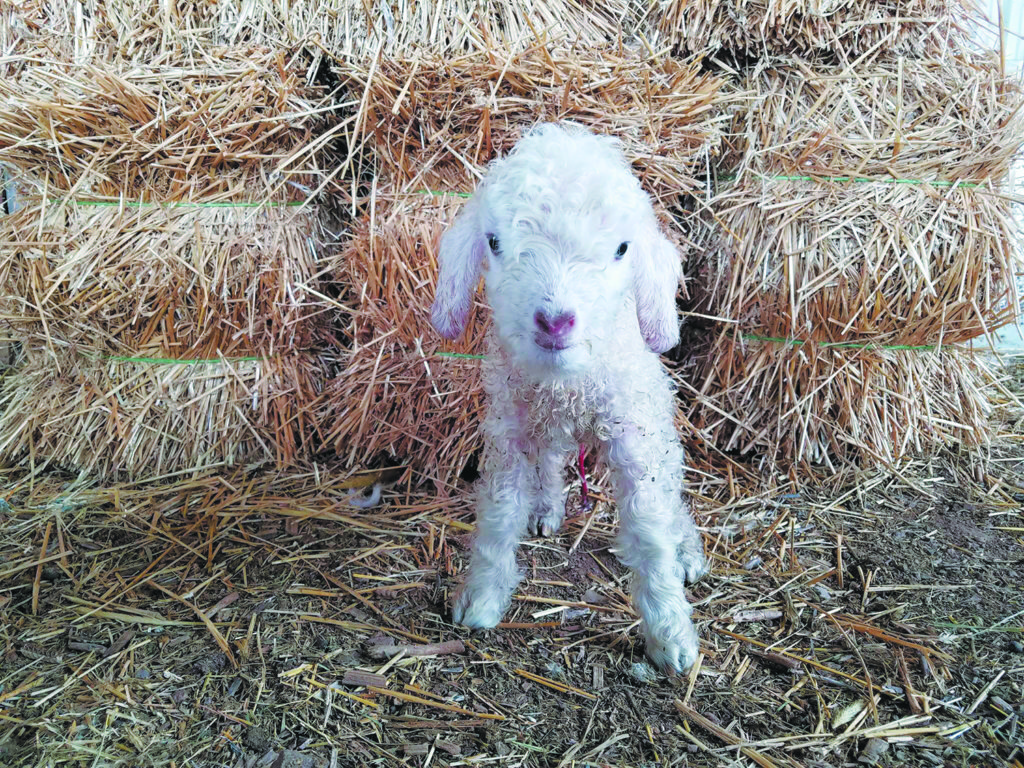A Perry County farm is churning out one of the finest fibers that become part of the most beautiful high fashion — and being shipped as far away as Antarctica.
Pure American Naturals is a partnership between agricultural professor/farmer Glen Cauffman and veterinarian Dr. Judith Shoemaker tucked away on a farm near Millerstown.
They raise and care for 300 angora goats. The goats have long, delicate hair — called mohair — that makes the animals mimic sheep prior to sheering.
According to Shoemaker, a foot can sweat inside a sock for hours, but the mohair fibers keep the sock dry.
“I can wear these for days,” Shoemaker said, and not worry about washing them. “The heat in the mohair wicks away,” she said.
Shoemaker noted that mohair is “slick.” Most of the socks produced by Pure American Naturals contain 70 percent mohair and 30 percent wool. Cauffman added that mohair is also inflammable. These fibers are used to make seats in airplanes.
The science of the mohair is one of the main reasons the fiber is purchased because of its ability to warm and even cool. Shoemaker said on the hottest of days mohair material can also cool the body.

Perfect partnership
Cauffman had raised sheep initially more than 30 years ago. He was also an agriculture teacher in a Perry County high school and spent some time teaching and working with Penn State Extension at University Park.
Cauffman discovered the sheep wool was not producing a decent profit. More folks wanted the sheep for meat purposes. Cauffman, however, was not interested in marketing meat since the price is often the same despite the quality of the animal.
He looked more closely into the aspect of angora goat farming, something he learned about in his early farming days.
Sheep wool is priced at 40 cents per pound, he said. Mohair from the angora goats is priced at $10 a pound.
He purchased 10 goats to start.
As his herd grew, he came to know Shoemaker through her vet services. She had a sister who raised a small herd of the same animals. They began to work together and develop a relationship.
Most angoras are raised in Texas, so putting animals used to a warmer and drier environment in unpredictable Pennsylvania weather was a challenge.
Shoemaker said the quality of the wool is based on the care of the farm and the proper treatment of the animals.

Far-reaching demand
Because of their careful practices, they are now selling their wool to companies who produce clothing for conditions in the coldest climates, such as Antarctica.
Socks, sweaters, hats, coats and more are critical in these areas, but more importantly, the buyers want material that will sustain lengths of time and not respond negatively to moisture.
This is a quality Cauffman and his marketing director, Christina Carl, talk about at universities. Carl, who grew up near Sunbury, makes all social media connections and gets Pure American Naturals lined up to speak at various educational events.
Design students from other states also visit the farm to understand how the raising of angora goats works.
“I’m an educator,” Cauffman said, “I am passionate about enlightening people about mohair and why it is so expensive.”
Part of educating on the mohair and its uses includes how the fiber is tested and considered for high quality use.
Attention to detail
In order to keep good data on the quality of the hair, a one-inch piece of fleece from each goat is put in a separate paper bag and weighed after the sheering process.
A small portion is sent to Texas A&M so they can gather data on the softness. Graphs show each goat’s hair quality over time.
There are six grades of the mohair.
They include: super kid, kid, yearling, fine young goat, fine adult and adult.
The super kid and kid grades go into making the softest yarn.
The goat hair at Pure Natural is the quality of a young goat, no matter how old the goat may be.
“We have 10 year-old goats producing ‘kid grade’ hair,” Cauffman said.

Special care
This is because of genetics.
The goats have been raised so carefully by monitoring individual health and keeping the animals free of parasites. Peacocks are on site in the barn with the goats to take care of such pests.
The animals are sheared twice a year by Mifflin County shearer Carl Geisenger.
During this time, the goats get a spa treatment and medical care all in one sitting. Shoemaker gives immunizations and gives full check up to each of the 300 goats. This process usually takes two days. The hooves are also examined and trimmed.
One of these special times is right before the female goats kid or give birth to baby goats. As the hair is removed ringlets are sought for the best quality fiber.
“These guys are little coat racks,” Shoemaker said of the animals, noting how they weigh 40 to 50 pounds, a much lower weight than meat goats which are made up of mainly muscle.
She said the goats are rotated through tall grasses every three days on 16 different pads. This is done so the grass is not eaten lower than six inches where worms can crawl up the grasses and harm the animals.
The soil on the farm is tested every year and water that flows from the stream on the farm is clean, Shoemaker said.
Quality is the priority
All of these environmental issues play an important factor in growing the best quality mohair that can be used for garments that cost hundreds and thousands of dollars, she said. A typical mohair fashionable scarf costs $350, for example.
Their efforts are working as national companies are seeking such quality.
The farm is working with Green Matters Natural Dye Company. This business uses sustainable, nonpoisonous materials that create fashionable colors.
The company also caught the eye of Vladimir Teriokhin, a well-known hand knitting designer.
The mohair farming business also gained the attention of fashion mogul Ralph Lauren a few years ago. Lauren was seeking material for the 2016 United States Olympic uniforms. PAN was considered and Cauffman and Carl traveled to his offices in New York City to be considered with other American-made fiber businesses.
Ultimately a Colorado based company won the opportunity. Cauffman said he and Carl have been in the Big Apple for major shows where they set up booths next to international companies. Fashion designers flock to the PAN table to learn more about mohair quality.
Cauffman is on the phone daily with retailers and designers who want to use the fiber in some form. Most recently PAN mohair was planned to be used in baby crib mattress pads.
“There’s just something about mohair that is really special,” Shoemaker said.
More information: pureamericannaturals.com


